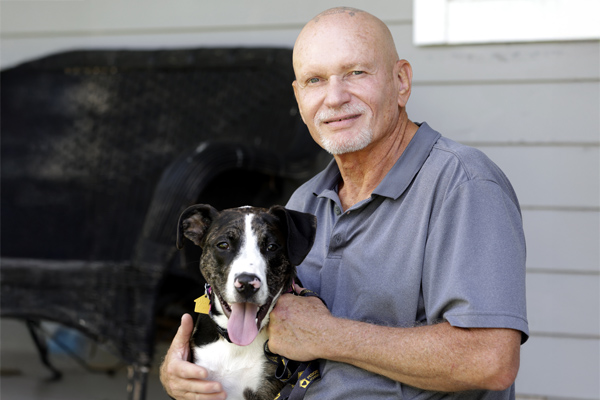
In an emotional moment at the Shade Tree Clinic, patient Faris Al-Jashami grasped medical student Stephen Dorner’s hand and vigorously shook it. He thanked Dorner repeatedly for helping him, but it wasn’t help for a medical problem.
Dorner and clinic volunteers are helping to return Al-Jashami’s family to him by untangling a nightmarish legal problem that might have had fatal results for Al-Jashami.
Dorner is one of 10 Vanderbilt University School of Medicine students on a social work team at the free, student-run health clinic in East Nashville. Social work and legal wrangling might not be what you’d expect from medical students, especially in a clinic setting designed for teaching future doctors, but it’s all part of the plan.
“Shade Tree exists primarily for patients who have great social needs. That’s one reason they come to us. It would be a mistake if we didn’t look at social and emotional health,” said Cooper Lloyd, second-year medical student and director of the social work team.
In fact, the need is so great, Lloyd and Dorner have worked with licensed master’s social worker Shannon Jordan to double the size of the team from five students to 10 this school year.
The social work team connects Shade Tree’s uninsured patients with services throughout the Nashville community.
In addition to helping people find ways to pay bills and receive low-cost or free services, students work on specialty programs.
This year the team is working to expand resources for mental health care, dental care and eye care. Dorner’s project is to expand the budding Medical-Legal Partnership (MLP).
“In the Medical-Legal Partnership we work on everything from advice about immigration to tax issues, disability applications, landlord trouble. Not traditional legal issues you might think about, but helping to solve contract issues and disputes,” Dorner said.
The Legal Aid Society of Middle Tennessee and the Cumberlands has partnered with Shade Tree to provide this service. Attorney Chay Sengkhounmany visits the clinic three times a month. Dorner has also expanded the MLP by bringing Vanderbilt law students to the clinic on a regular basis.

Al-Jashami’s case is perhaps the most heart-rending and rewarding the team has experienced so far. Al-Jashami had come in to Shade Tree experiencing chest pains.
Students and their medical mentors ruled out the immediate concern of a heart attack, but Al-Jashami confided to the team that he was feeling tremendous stress in his personal life.
“Last spring my wife had returned to Mexico with our 12-year-old son. He is a U.S. citizen, and I am too. She returned to get the proper documentation for herself. But once she got there, the government told her she could not return to the U.S. for 10 more years,” Al-Jashami said.
Al-Jashami had escaped the regime of Saddam Hussein in the 1990s, and was able to become a citizen as a refugee of war. But for his wife, Claudia, citizenship would not be so easy. She had come into the country illegally many years ago, then married Al-Jashami and together they began a family.
The couple had heard that because Al-Jashami still suffered from symptoms of post-traumatic stress from his experiences in Iraq, they might be able to apply for an extreme hardship exception in the immigration law to allow the couple to finally be together legally in the United States.
But since they had no legal help preparing the documents, her request was denied.
“I lost my family in the Middle East when I became a citizen of the United States. Now Claudia and Moohamed are all I have. Without them I could not go on. I even considered suicide,” Al-Jashami said.

“This is a strong case,” Sengkhounmany said. “Because of his documented treatment at Shade Tree for PTSD, I was able to sit down with Stephen (Dorner) and the medical team and say this is what I need to prove the hardship that would be caused by separating this couple. The wonderful thing is just after the holidays, I got the letter that the waiver and visa were approved.”
Now the family is just waiting for the U.S. consulate in Mexico to process and issue her visa. Everyone at Shade Tree is waiting for the moment when they see the family together again.
Dorner and Lloyd agree that experiences like this will have a lasting impact on their medical practice one day.
“This is a microcosm of providing care,” Dorner said. “It is a great place to see where the potential shortfalls are in our system that could lead to serious illnesses. Being able to work alongside lawyers and law students and social workers who have such a different perspective and bringing views together to solve obstacles to patient care — it makes me a true believer in the interdisciplinary model.”

















